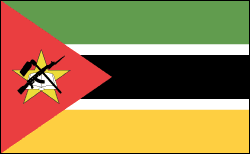Mozambique News & Current Events


Civil War
On Jan. 25, 1985, after a decade of independence, the government became locked in a paralyzing war with antigovernment guerrillas, the Mozambique National Resistance (MNR, or Renamo), who were backed by the white minority government in South Africa. The guerrilla movement weakened President Chissanó's attempts to institute socialism, which he then decided to abandon in 1989. A new constitution was drafted calling for three branches of government and the granting civil liberties. A cease-fire agreement signed in Oct. 1992 between the government and the MNR ended 6 years of civil war.
Democracy and Economic Growth
In multiparty elections in 1994, President Chissanó won. In Nov. 1995, the country was the first nonformer British colony to become a member of the British Commonwealth. The president's disciplined economic plan was highly successful, winning the country foreign confidence and aid. While Mozambique posted some of the world's largest economic growth rates in the late 1990s, it has suffered enormous setbacks because of natural disasters, such as the enormous damage caused by severe flooding in the winters of 2000 and 2001. Hundreds died and thousands were displaced.
In 2002, Chissanó announced he would not seek a third term. FRELIMO's candidate, independence hero Armando Guebuza, was elected president and sworn in on Feb. 2, 2005.
In Oct. 2012, President Armando Guebuza relieved Prime Minister Aires Ali of his duties amid a cabinet reshuffle and named Alberto Vaquina as new prime minister. Economic growth continues in Mozambique. New coal and gas resources promise to support an estimated 7% growth in 2013.
Peace Pact Collapses Between Opposition and Government
On October 21, 2013, the Renamo opposition movement announced it was abandoning the 1992 peace treaty with the governing FRELIMO party. The opposition and government troops had been battling for about a year. Renamo made the announcement after government troops attacked a Renamo base where Afonso Dhlakama, Renamo's leader, was staying. Dhlakama was forced to flee. Fernando Mazanga, a Renamo spokesperson, said "Peace is over in the country. The responsibility lies with the Frelimo government because they didn't want to listen to Renamo's grievances."
The day after Renamo announced that the treaty was no longer, they attacked a police station in Maringue. There were no casualties or injuries reported. The government did not respond to the police station attack or Renamo's announcement. The 1992 Rome General Peace Accords ended Mozambique's 1975-92 civil war. Renamo's announcement to abandon the treaty raised concerns that the conflict between the two parties would be renewed.After protracted negotiations, Renamo and the government signed a ceasefire in August 2014.
FRELIMO Keeps Majority in 2014 General Election
Mozambique held its general elections on Oct. 15, 2014. The ruling party, FRELIMO, kept its majority in parliament. FRELIMO took 144 out of 250 seats while the opposition party, Renamo, took 89 seats. FRELIMO's candidate, Filipe Nyusi, was elected president, receiving 57.03% of the vote. Afonso Dhlakama, Renamo's candidate, received 36.61% of the vote.
After the election, Dhlakama accused the results of being fraudulent. He threatened to set up a rival Renamo government, but later backed down. However, Renamo did protest the election results by boycotting the swearing in of provincial parliaments.
See also Encyclopedia: Mozambique .
U.S. State Dept. Country Notes: Mozambique







